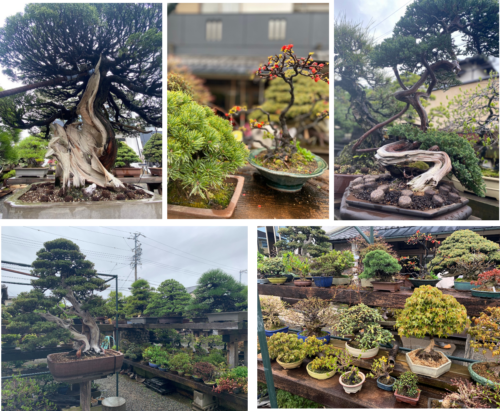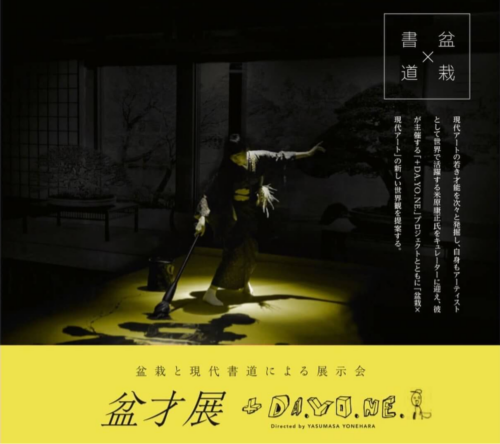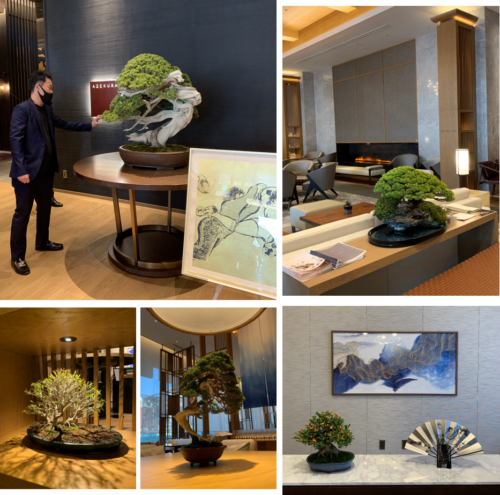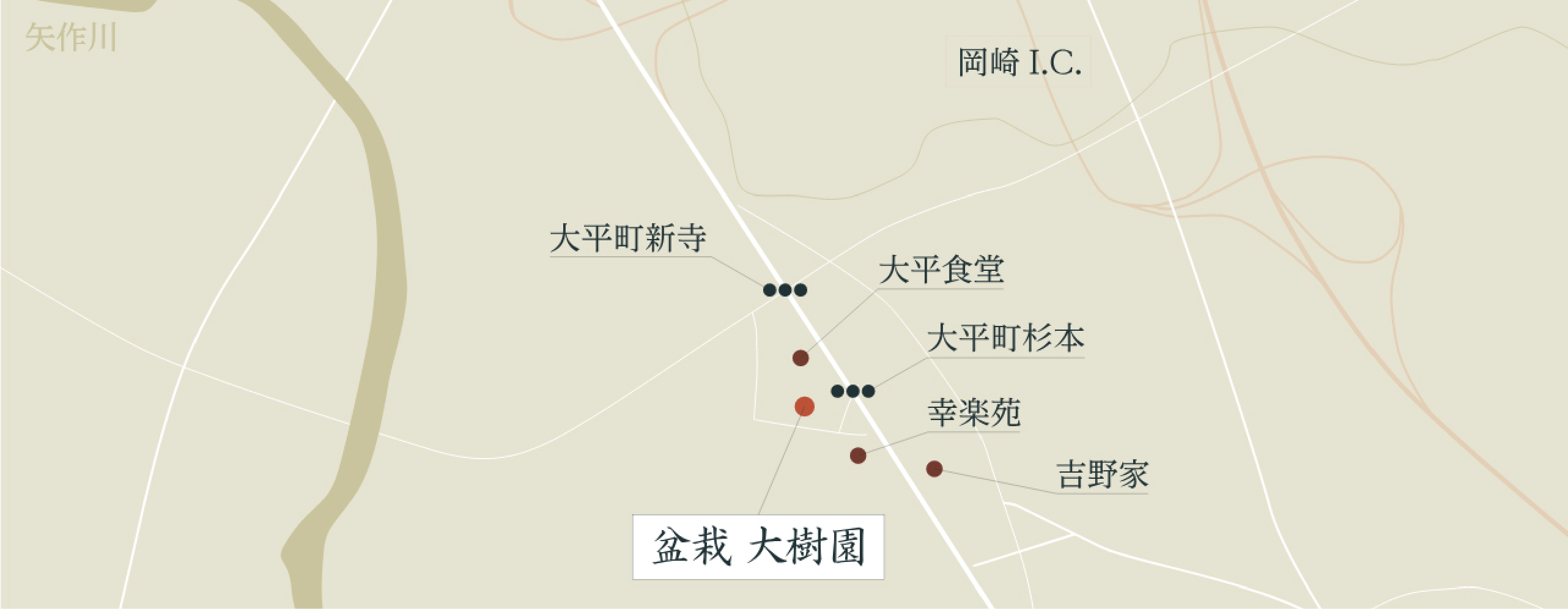Issued by Z-EN (Original link is here) 2022/6/28
This interview was featured in “Z-EN”, an information media for enjoying management. We talked about the bonsai industry today, our challenges, and our thoughts on bonsai NFT.
Breathing new life
目次
into the tradition of the bonsai industry
The Challenge of the “Outsider” Fourth Generation#1
Bonsai, a traditional Japanese culture, was introduced from China 1,300 years ago during the Heian period (794-1192) and was loved by the ruling class.
Daijuen is a long-established bonsai garden in Okazaki City, Aichi Prefecture, where many bonsai are sublimated into works of art that are distinctly different from gardening.
Takuya Suzuki, the fourth-generation owner, came to the bonsai world from another industry.
In addition to Daijuen’s long-standing technical expertise, he is breathing new life into a traditional industry with his innovative marketing techniques.
We interviewed Mr. Suzuki, who is promoting the value of bonsai as a symbol of Japanese art and attracting new fans. We hope you will learn what is happening in the bonsai industry today.

CONTENTS
Chapter 1
1. Succession of one of the best bonsai gardens in Japan
Chapter2
1.How to overcome the difficulties of the bonsai industry
1.1 The old structure must be changed
1.2 Innovation from a newcomer’s point of view
1.3 “Make the appeal of bonsai widely known”.
【Chapter 1】
1. Succession of one of the best bonsai gardens in Japan
Z-EN: Thank you for joining us today. Bonsai is a representative of Japanese culture, and you are the fourth-generation owner of the famous Bonsai Daijuen, which has been in existence since 1934.
Takuya Suzuki (Suzuki) : Daijuen is a bonsai garden in Okazaki City, Aichi Prefecture. The garden was founded by the first-generation Saichi Suzuki, who discovered and popularized the short-leaf method for black pine trees. I joined this family as the husband of Daijuen’s daughter, but until then I had no experience with bonsai.
After studying and working in architecture, my love of cooking led e to become a chef.
So even after marriage, I kept my distance from my wife’s family’s business in the bonsai garden.
Z-EN: What made you become involved in bonsai?
Suzuki : The trigger was the Great East Japan Earthquake.
At the time of the earthquake, my wife was about to give birth. I began to think about how important it was to spend time with my family.
As a chef, I had to work on weekends, so it was difficult for me to realize my dream.
I became aware of the possibility of following in his footsteps while watching my father-in-law run the family business, Daijuen, with his family.
I had been in the craft business for many years, and I am also an enthusiasm for one thing person by nature, so I almost became addicted to bonsai when I discovered how much fun it was.
When I told my father-in-law, “Please let me take over the business,” he was surprised.
Later, I learned that Daijuen is one of the top five brands in the bonsai industry, and I felt that I had overstepped my bounds (laughs), but I am glad that I did not feel self-conscious about joining the company.
【Chapter 2】
1.Bonsai Industry’s Way Out of a Struggling Situation
Z-EN: Your father-in-law, I am sure he was happy inside. (laughs) What is it like working in a bonsai garden?
Suzuki : The main work of a bonsai garden is to take care of and maintain customers’ bonsai and to sell new ones.
We have owners who love bonsai.
The bonsai garden will introduce them to the owner and say, “This tree will definitely make a great bonsai.” The owner buys the tree, and the bonsai garden receives a maintenance fee and grows the tree.
It’s a cooperative business, so to speak, where the owner is happy that his bonsai is gaining in property value.
1.1 Change the old structure
Z-EN: What is the state of the bonsai industry today?
Suzuki : Unfortunately, the industry itself is shrinking year by year, and in the last 10 years, nearly 10% of all vendors have closed their businesses due to lack of successors.
There are actually very few new entrants from other industries like myself.
There is still a tendency in some parts of the industry to think that if you keep making good products, customers will follow you. In reality, however, both the number of enthusiasts and the price of bonsai have dropped to less than one-tenth of what they were during the bubble era.
The current age group of customers is also aging, ranging from 50s to 70s. The number of domestic sales is also declining further, so this is a phase in which the industry as a whole must make a renewed effort.
The old system of only dealing with regular customers and not conducting new sales activities, and putting up a “closed” sign at the entrance to refuse first-time customers, must be reformed.
1.2 Innovation from a Newcomer’s Perspective
Z-EN: I see. It is a tough industry… Mr. Suzuki, I hear that you are challenging various reforms from the perspective of other industries.
Suzuki : Yes, that’s right. As a person from the outside, I usually try not to lose the outside perspective, and to keep questioning and challenging things that are out of sync.
We have created a website and sell bonsai through e-commerce as well, introduce our works on various social networking sites such as Facebook and Instagram, and actively market our products.
To be honest, at first we received some pushback from within the industry.
But we actually made a change, and the situation surrounding Daijuen has been changing.
Results are gradually coming in and new customers are being brought in.

1.3 Spreading the appeal of bonsai
Suzuki : Recently, we have been taking opportunities to hold exhibitions, appreciation events, and collaborative events with other industries in order to reach as many young people as possible.
The other day, we had bonsai placed throughout the JW Marriott Hotel Nara and held an appreciation event.
Many people think of pine trees when they think of bonsai, but there are many different types of bonsai, including those that bloom, those that bear fruit, and those that turn red.
As a bonsai tree grows older, the stability and grandeur of its roots, branches, and trunk combine to give the viewer a variety of impressions.
The beauty of the planted containers is also a highlight.
When I tell people these things, they are very interested in bonsai.

(Pic: JW Marriott Nara by Z-EN)
Z-EN: It is not often that we get a chance to learn about bonsai. I am very interested in what you are saying.
Suzuki : I am glad to see that people who have never had the opportunity to experience bonsai are interested in it, and it is good for the industry.
Daijuen also offers a Rental Bonsai Service to give people as many opportunities as possible to appreciate bonsai. We have them placed in hotels, inns, and corporate reception areas.
They are very flowery and well received.
Z-EN: Mr. Suzuki came to the bonsai industry from a different industry. He tries new challenges one after another to reform the old structure. In the second part, “Challenge to Bonsai NFT! The world’s first NFT that combines real and digital technologies,” Mr. Suzuki will talk about the world’s first NFT that combines real and digital technologies in the bonsai industry, and the current state of the bonsai industry.


